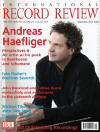Texte paru dans: / Appeared in:
*

International Record Review - (09//2014)
Pour
s'abonner / Subscription information
Harmonia Mundi
HMU807524

Code-barres / Barcode : 0093046752460 (ID407)
This disc is the sequel to Anonymous 4's 1993‑94 disc entitled 'Love's Illusion' (Harmonia Mundi, reviewed by Andrew O'Connor in July/August 2003). That earlier disc featured two‑, three‑ and four‑voiced polyphonic motets on (with one exception) French courtly love texts, all from the Montpellier Codex, a large manuscript containing 336 works over 400 folios, compiled in Paris from 1280 to 1300. The motets on the new disc are also from the Montpellier Codex, but this time the programme combines devotional motets, usually in Latin, extolling the Virgin ‑ the 'Marie' of the disc's title ‑ with those concerning fin amours or pastoral love ‑a genre in which the male protagonist's object of affection is sometimes a non‑noble woman or a shepherdess named 'Marion'. Interestingly, the last work on the disc, Plus bele queflore, is a new performance of the single Marian motet Anonymous 4 included on their earlier disc.
The motets are not only polyphonic but also polytextual, with one voice (tenor) usually based on a plainchant fragment in Latin (or, very occasionally, part of a dance or popular song) and the other one, two or three voices (motetus, triplum and quadruplum respectively) each singing its own text while weaving a contrapuntal fabric around the steady tenor.
Inserted in the programme are four monophonic trouvère love songs, although one of them is a chanson pieuse (devotional song) addressed to the Virgin. Each of Anonymous 4's members sings one of them. The a cappella quartet's purpose is to demonstrate the similarities of texts and melodies in the motet and trouvère repertories. This is especially evident in the three two voice motets (tenor and motetus) on the disc, whose melodies resemble trouvère chansons and whose texts sometimes employ surprisingly erotic imagery to venerate the Blessed Virgin.
As always, Anonymous 4's approach to performance is informed by solid scholarship. The booklet includes a note about the ensemble's effort to adopt a thirteenth-century French pronunciation of both Latin and the vernacular tongue. ‑The modern editors of the works are also scrupulously acknowledged. However, it is unlikely these works were originally performed by women. The Montpellier Codex was probably compiled by a cleric and apparently for performance within Parisian clerical circles rather than with a purely archival intention. This suggests all voices were probably sung by males. It is possible sufficiently trained and skilled male adolescents whose voices had not yet broken were available, but more likely that the singers were adult men. Thus, Anonymous 4's sound, for all its refined blend, perfect tuning and luminous tone, while a very attractive performance option, is unlikely to have been heard by the manuscript's original audience.
The first Montpellier Codex disc, issued 21 years ago, was Anonymous 4's third. This one is its twenty‑fifth. Since 1993, the group's membership has changed very little: Johanna Rose was replaced in 1998 by Jacqueline Horner‑Kwiatek. She has a markedly more operatic voice than her three colleagues, heavier in tone and, in her trouvère chanson solo (J’ai un cuer trop lait), a lot more vibrato. This affects the sound of the ensemble when singing together: the tone is marginally less pure and perfectly blended than on the earlier disc ‑ although the passage of two decades also appears to have had some effect on all the singers. However, their clarity of diction, security of intonation, rhythmic sensitivity, poise and fundamental musicality have remained unaffected, even while the group's sound has gained in warmth.
As usual for Anonymous 4's discs, the presentation is superb. The cover features the initial of one of the manuscript's motets (not sung on the disc) in an illustrated square in red, blue, violet, green and orange, while other attractive miniatures and decorations from the manuscript appear throughout the booklet. The programme notes are informative but too brief (always a usual feature of Anonymous 4 discs). Also customary, the recording was made in a modern studio with a warm and only faintly reverberant acoustic. The standard stereo CD version included on this hybrid SACD is clear and flattering to the voices; the high‑resolution DSD version played on an SACD‑capable player brings a slightly greater immediacy to the voices.
Nevertheless, no matter how beautifully sung, the thirteenth‑century French motet is not an easily accessible genre. This and the risk of aural fatigue from an unbroken 56 minutes of a cappella sopranos and mezzos suggest it is better to appreciate this disc in smallish chunks.
Cliquez l'un ou l'autre
bouton pour découvrir bien d'autres critiques de CD
Click either button for many other reviews


